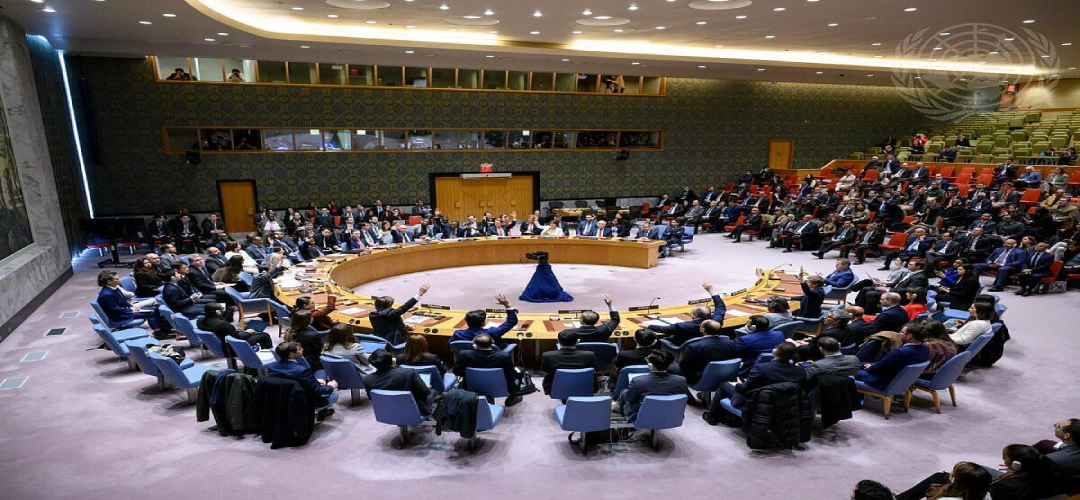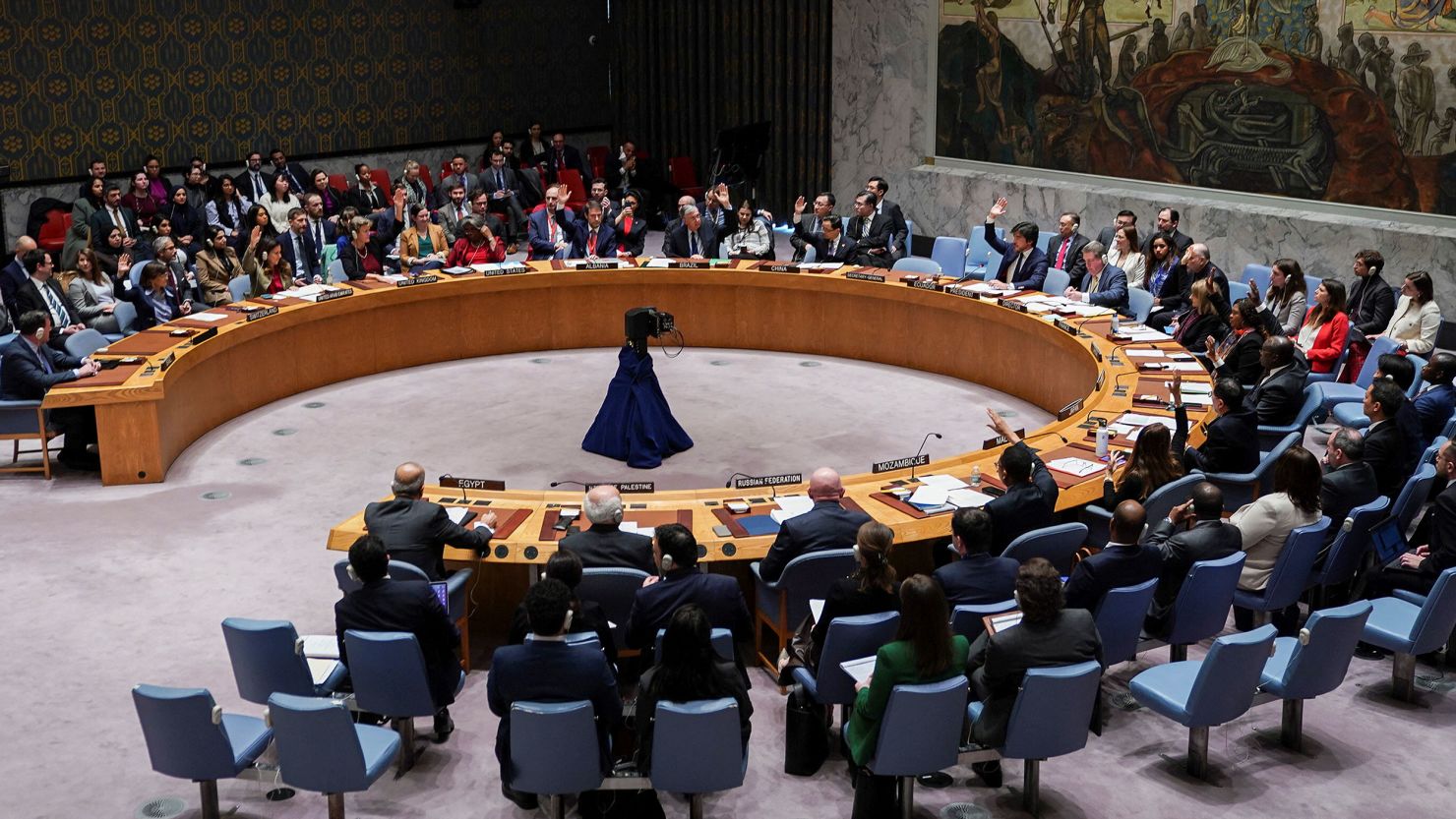Games in the UNSC and Beyond
March 30, 2024 | Expert Insights

The sad spectacle of the UNSC failing miserably to act as a catalyst to stop fighting first in Ukraine and now in Gaza has continued to torment the collective global consciousness, whatever little of it remains.
Resolution 2728 was passed on March 25 (after 171 days of fighting) by a vote of 14 in favour to none against, with one abstention (United States). By its terms, as per the UN statement, “it demanded an immediate ceasefire for the month of Ramadan respected by all parties, leading to a lasting sustainable ceasefire. It also demanded the immediate and unconditional release of all hostages, as well as ensuring humanitarian access to address their medical and other humanitarian needs”.
But is it enough?
Background
The Israel-Palestinian conflict needs no recapitulation as it has marred the human fabric of our globe since the late 19th century. Suffice it to say that with the senseless and bloody intrusion launched by Hamas on October 7 last year and the consequent harsh Israeli retribution, it has once again become the top hot spot of global conflict.
The Resolution's passage has been accompanied by high drama, including weeks of back and forth and posturing among the P5 and the rotating members. Expectedly, every word of the Resolution has been subject to intense scrutiny by the public and media, raising serious questions on its intent, limitations, and the subtext underlining the body of the Resolution.
There are three reasons why the latest Resolution 2728 matters but fails to hold value given the current circumstances. Primarily, it represents the US's growing frustration with the Israeli government. Second, the Resolution represents a change in the way the liberal majority views Israel and its activities in Gaza. Lastly, the protests and departure of the Israeli government's top leadership reflect the instability of Israel's domestic politics, leading to possible consequential changes for the state of Israel both locally and globally.

Analysis
The UN has been criticising Israel for an increase in the civilian death toll in Gaza, with over 32,000 people killed by Israel's bombardment. The international community has also urged Israel to deliver aid to Gaza, citing severe food insecurity. It is imperative to highlight the grassroots realities in Gaza before the October 7th Attacks. Violence did not enter Gaza after the October 7th Attacks; the region was hostile, with frequent skirmishes between Hamas operatives and the IDF. With humanitarian assistance being provided to 80% of the population, 50% of them unemployed, Gaza has witnessed blockades for around 16 years before the current conflict. However, with the IDF’s intensive and accelerated attacks, International Communities have changed their narrative towards the conflict.
After the U.S. abstained from voting on the recent UN Resolution, the Israeli government denied permission to its pre-planned delegation to visit Washington. This might be an expensive decision for Netanyahu's Government, while the U.S. continues to provide military aid despite mounting domestic and international criticism. The US does not have to support Israel. With the elections in the US coming up, ground calls for a ceasefire have forced Biden's political campaign to have a more restrained public opinion toward the Palestinian population. Patience in the US might be wearing out as the key Arab voter demographic has refrained from supporting Biden. Hence, pushing away the U.S.‘s support is not a wise decision for Israel.
This Resolution reflects the mainstream perception of support shifting to the Palestinian people during Ramadan but fails to break the battlefield dynamics and bring change. Failure of the Doha negotiation has sabotaged diplomacy between Israel and Hamas. Fundamentally, Hamas refuses to release all the hostages at once, and Israel's determination to destroy Israel does not seem to change anytime soon. This has resulted in continued violence in the region, with severe famine causing paper-thin babies and a destroyed healthcare system.
Netanyahu cancelled a high-level delegation to Washington to discuss alternatives to an Israeli offensive into Rafah. Pressure from his far-right political heads and growing calls for his resignation has cornered the Israeli Prime Minister. Amidst the violent chaos and confusion, Israeli settlers have drawn maps to occupy the war-torn Gaza Strip as a symbolic return to Gush Katif.
The internal political situation in Israel is getting even more precarious with every passing day. As per the US Institute of Peace (USIP) article of March 26, on the same day as the U.N. resolution's passage, Gideon Sa'ar, leader of Israel's New Hope Party, announced the party will leave the governing coalition, dropping the emergency government's majority to 72 seats of 120 in the Knesset. Among Israelis, Netanyahu himself is very unpopular — a January poll shows only 15 per cent want him to remain prime minister after the war — but Israelis also mostly support the government's tactics and rhetoric around dealing Hamas a final defeat. How long the coalition holds together will be an important factor in how Israel addresses Gaza and its international partnerships.
Assessment
- Although welcomed by the International Committee, the Resolution does not have the weight to be enforced on the ground. The conflict getting worse will see increased spike despite skirmishes in the Israel-Jorden border and the Houthis' attacking skips in the Red Sea. The UN Resolution has so far proved to be ineffective in providing the gravity for a ceasefire and, conversely, might help increase the IDF’s offensive.
- Negotiations in Doha have reached a dead end despite international interventions. However, Hamas has become a greater threat to the Palestinian people. A dying Palestinian continues to aid Hamas while making Israel look bad on the global stage.
- With the conflict surging and the UN Resolution not making significant changes on the ground, Israel will need to create predictable corridors to surge Humanitarian Assistance to prevent its geo-political isolation.








Comments